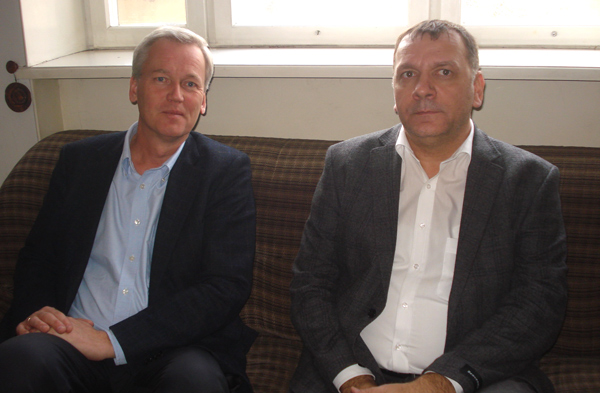Russia’s pressure, “frozen” conflict, mutual confidence and Norwegian experts’ concerns
The Norwegian Helsinki Committee (NHC) Secretary General, Bjørn Engesland, and Head of the Education Department on NHC Human Rights, Enver Djuliman, days ago, visited Armenia and Georgia, and met with regional partners. In the conversation with Aravot, the experts spoke about the regional projects and existing problems. Bjørn Engesland informed that their programs are related to implementation of curriculum on human rights protection. Note that “Alliance for confidence” program launched since 2012, which is aimed at the establishment and strengthening of mutual trust between nations in the region. It is noteworthy that under the program works are carried out with representatives of Nagorno-Karabakh, Abkhazia and South Ossetia. In the conversation with us, Bjørn Engesland told that he has met with a number of officials in Armenia and was impressed by preparedness of the RA human rights defender. To our question whether a progress on human right defense is observed in Armenia, Mr. Engesland said, “There are still problems, which are mainly related to non-independence of the judiciary, and corruption.” Enver Djuliman, during the conversation, considered trust as a core tool for the settlement of all problems and conflicts. He emphasized, “With the help of curriculum, we want to promote the establishment of mutual trust between Armenia, Georgia and Azerbaijan, including Nagorno-Karabakh, Abkhazia, and South Ossetia in the process. We are working with human rights defenders, activists and journalists, we have involved over 270 people. With our work with these people, we want to inject new, peacemaking notions in the consciousness of all parties.” To our question of whether the old stereotypes do not interfere, such as Armenia and Azerbaijan representatives to overcome the lined pages of the history and to establish new relationship. Mr. Djuliman noted, “All regional countries, especially Armenia and Azerbaijan, have identical memories, which can be a good basis for re-establishing relations.” To our question of whether the periodic boundary diversionary attacks from Azerbaijan side do not obstacle the NHC peace-building programs in the region, Enver Djuliman responded, “Of course, they do, it is one of serious problems that results in the continuation of the conflict. What is important here is whether the two sides are willing to listen to each other, to accept the other side’s truth.” With regard to the question on Nagorno-Karabakh conflict, Bjørn Engesland considered it “frozen”, and refrained from giving a political assessment. “We do not try to solve everything, but we try to solve something.” Later, Mr. Engesland reminded that they have repeatedly criticized the Azerbaijani government and are concerned about the existing problems in protection of human rights in this country. He stressed that even one of their colleague Khadija Ismayilova’s rights are seriously violated in that country. The conversation turned and reached the Ukrainian revolution. Mr. Engesland considered Russia’s pressure on this country evident. With regard to the question of whether Russia has also exerted pressure on Armenia given Armenia’s decision to join the Customs Union, Mr. Engesland expressed the following opinion, “I do not know what kind of pressure is exerted on Armenia, but Armenia is a small country, and at some level, especially on security, depends on Russia.” In his speech, Mr. Engesland referred to the existing problems in the field of human rights protection in Russia. To our question of where Armenia is headed towards in this case in joining the Customs Union, Mr. Engesland responded, “Armenia is headed towards Russia. Currently, I can not say how it can affect Armenia, but there are some concerns, given the existing problems in the field of human rights in Russia”.
Tatev HARUTYUNYAN
On the photo from the left, Bjørn Engesland and Enver Djuliman























































